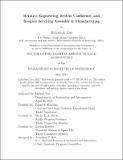Iterative Engineering, System Confidence, and In-space Servicing Assembly & Manufacturing
Author(s)
Luu, Michael A.
DownloadThesis PDF (86.71Mb)
Advisor
Hastings, Daniel E.
Terms of use
Metadata
Show full item recordAbstract
System Confidence is proposed as a method for quantifying the progress and performance of engineering systems. Confidence measures the degree of certainty that a system, design, or process will perform as intended. This metric aggregates existing tools in model-based systems engineering with requirement verification/test events. This is used to mitigate the obstacles of adopting iterative engineering for hardware systems due to the loosely defined requirements set at the beginning of these programs.
Iterative engineering has enabled the rapid progress of recent commercial space systems, reduced launch costs through reusable rockets, and deployed large-scale constellations to orbit. This engineering method has been made possible through recent advancements in digital engineering, additive manufacturing, scalable systems, modeling, and simulation software. Iterative engineering challenges the traditional V-model of systems engineering as the default and only choice in designing complex space systems. Rapidly testing novel payloads and satellite capabilities early in the design process can reduce development schedules and deliver capabilities earlier than traditional systems.
The advent of In-space Servicing, Assembly, and Manufacturing (ISAM) has ignited new prospects for system architectures, designs, and applications. Until now, iterative engineering has only leveraged in designing robust space systems to be resilient and self-reliant in post-launch deployment/operations. ISAM extends options, flexibility, and engineering decisions beyond the launch phase of space systems.
First, System Confidence is defined and quantified, measuring a system's capabilities throughout its development cycle. Second, System Confidence is used to evaluate three existing and historic space programs. Third, ISAM is explored as an extension of iterative engineering for space systems. Lastly, the relationship between iterative engineering outcomes and the utility of ISAM for a space systems architecture is analyzed.
Date issued
2023-06Department
Massachusetts Institute of Technology. Department of Aeronautics and AstronauticsPublisher
Massachusetts Institute of Technology